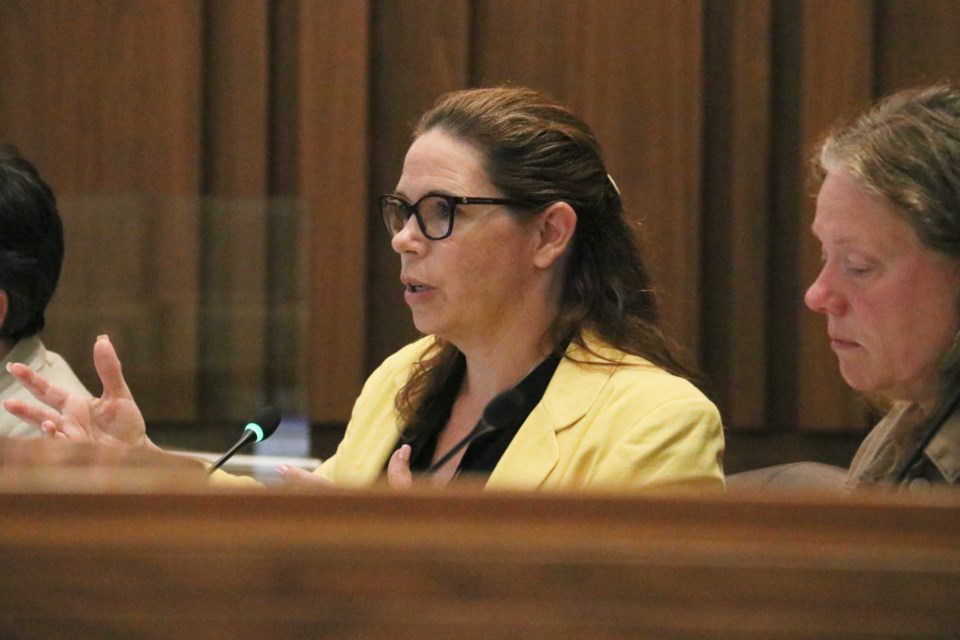City council unanimously approved one-time funding of $450,000 to provide basic needs for those living in encampments during its Wednesday night meeting.
Coun. Dominique O’Rourke brought forward a motion at the end of the night for an add-on to the public space use bylaw, to flow up to $450,000 from the operating contingency reserve to the County of Wellington to help the unhoused population meet its basic needs.
It was passed unanimously.
“We’ve heard repeatedly about this dire need for access to washrooms or to water or day shelter, somewhere to do laundry, somewhere for storage, because people who are in shelters, who leave and have all of their belongings with them at eight in the morning, they want to put them somewhere safe so that they can go and access their services,” O’Rourke said.
“We’ve heard it many, many times. We heard it at the health and housing symposium (hosted by the County of Wellington), and we heard it again tonight.”
The funding is to be allocated starting in September, and be completed no later than December 2025.
Those dollars are to be provided “following receipt of the interim and final reports from the planning table, subject to the satisfaction of the deputy CAO of public services.”
The amount of city funding could be reduced if federal or provincial funds are committed.
“We know that there are really critical basic needs for people to live with dignity day to day. We want a perfect solution, we want long-term plans, but we want action right now. This is setting aside funds for action right now on some basic things while we work on those longer-term things, while we work on what a full daytime hub looks like, what better mental health and addiction services look like.”
The proposal reflects conversations taking place about basic needs at the health and housing planning table, she said.
O’Rourke herself is a member of the basic needs subgroup that came out of the county's health and sousing symposium, which consists of 20 to 25 individuals representing agencies and front-line workers.
The intention is for deputy CAO Colleen Clack-Bush to oversee the disbursement “for projects that will meet the basic needs for the unhoused people,” she said.
“The process is a little unusual, but we’ve done unusual things before,” she said. “I just didn’t want to wait until the budget. We keep talking about, how come we’re not seeing action? These funds would permit some action in the short-term."
“This work is obviously a little bit outside our normal process, that this money is being pulled from a reserve and you have not yet seen the county social services budget,” Clack-Bush said. “But … I am comfortable with this because of it being at the recommendation of the health and housing planning table. I will simply be the person, who on your behalf, signs off on those recommendations so we can flow that money.”
This is because the health and housing planning table doesn’t exist as a legal entity, so money can’t be flowed directly to it, and instead will go through the county.
Mayor Cam Guthrie noted last year $100,000 was approved to go toward encampments for this year’s budget, but Clack-Bush said that funding dried up in June, so the $450,000 would be a continuation of that work.
Guthrie said he thinks the move is a beneficial one, and Coun. Linda Busuttil said, while passing the bylaw was a bitter pill for her, “this is something positive.”
Exactly what those basic needs are will be determined in conversation with the County of Wellington.
Coun. Leanne Caron said she doesn’t think the funding amount will cover every basic need, “but the status quo isn’t working. We have to move forward with some resources.”
A secondary, complimentary motion was brought forward by Coun. Erin Caton directing city staff to work with the planning table to develop a plan, including a budget and funding source, to provide and maintain portable washrooms, waste bins and sharps disposal to encampments in Guelph, subject to site feasibility.
It was also passed unanimously.
Staff is expected to report back to city council with a plan and what that might cost in the first fiscal quarter of 2025.
Clack-Bush said it needed to be a separate motion because the porta potties alone would eat up a significant chunk of the $450,000.
“These are very specific issues that were brought up multiple times by various delegates. I think that while more permanent solutions and daytime centres and other things are being established, that bringing these things to encampments … would be an important extra step,” Caton said.
